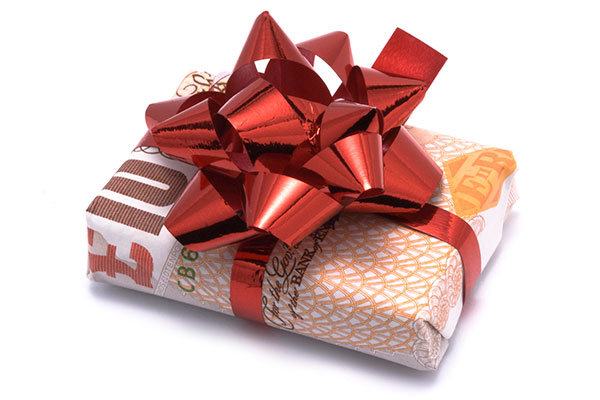Top 10 things you need to know about making financial gifts
16th December 2021 12:14
by Faith Glasgow from interactive investor
It’s the time of year when we exchange presents with friends and loved ones, but it doesn’t always have to be socks and chocolates. Faith Glasgow has some great gift ideas that are not just for Christmas.

Giving money can be a surprisingly controversial business, and not just at Christmas. Issues such as the need to be fair to the whole family can be tricky, as can questions of when and how children access their cash and what they spend it on - not to mention the tax implications of the gift.
As a Christmas or birthday present, meanwhile, money can seem like a cop-out to sidestep ‘proper’, thoughtful present-giving. It certainly takes minimal effort to slip a couple of tenners in an envelope for Christmas, though the recipients generally appreciate the gesture.
Yet with a little thought you can give a financial gift that will grow over time and could make a really meaningful difference to the recipient’s life in years to come. Below, we take a look at some alternative routes and things to know about giving money to family, friends and charities, both in the festive season and beyond.
- Invest with ii: Open a Junior ISA | Share Dealing with ii | ISA Offers & Cashback
1 Build a baby fund
As any new parent knows, babies receive an awful lot of cute stuff they don’t appreciate. So, rather than adding to the pile of babygros and floppy bunnies for the new arrival, why not ask the parents for details of the baby’s Junior ISA?
If they haven’t set one up yet, such a request might spur them into action, meaning that the little one has a fund growing in their name right from the start. They won’t be able to access it until they reach 18, at which point it will roll over into an adult ISA. Until then, annual contributions of up to £9,000 (2021/22 tax year) can be made.
As a parent, you could pre-empt the request by sending the account details (and a photo of the baby dressed up as a reindeer, obviously) to family and close friends, in case they like the idea of a long-term fund.
The best rate cash Junior ISA pays 2.5% and comes from the Loughborough BS, but for a timescale of 18 years-plusit makes sense to look at stocks and shares Junior ISAs such as that from ii.
To give an idea of what it might look like for the baby when they reach 18, if family members contributed a total of £200 at birthdays and Christmas each year into a fund growing at an average 6% a year, they would have around £7,250 at 18. If they put in £5,000 a year, the fund would be worth almost £160,000.
- 20 best-performing funds since Junior ISA launched a decade ago
- Learn more about our Junior Stocks and Shares ISA
2 Birthday bonds
Historically,premium bonds have been a popular financial choice for kids. However, National Savings & Investments (NS&I) has lengthened the odds in recent years. With £1,000 of premium bonds your child now has a 29% chance of winning any prize in a single year, and a one in 4.8 million chance of winning the £1 million jackpot.
Most likely they will get the occasional £25 prize, which can be reinvested to boost your chance of further winnings. It’s very unlikely to be profitable, but it’s quite fun.
- Seven ‘buy and forget’ shares for investors with time on their side
- Mind & Money: we need to talk about inheritance
3 Boost a child account
Older children may have a dedicated child current account designed to teach good financial habits, such as GoHenry or Rooster; rather than giving cash, you could make a gift payment straight into the account. For example GoHenry has a facility called Giftlink which the parents can share with friends and family to enable such transfers.

4 Pension planning
It’s fair to say that if your daughter shrieks with joy when told that her fairy godfather’s birthday present is a contribution to a pension that she won’t be able to touch until she is ancient (ie in her late 50s), she is not an ordinary child. But fast-forward five decades and she may have a very different perspective.
Parents or guardians can set up a stakeholder pension for their child, but anyone can then pay in, up to a total £2,880 each year. The government will then top this up with 20% tax relief to £3,600. When the child reaches 18, the pension passes into her name.
That ultra-long timescale means that the money can be invested in riskier parts of the stock market - smaller companies, emerging markets or green energy, for instance. But it also means returns compound (in other words, growth and income is reinvested and itself generates returns, and so on) for decades.
To put that into context: if the full £3,600 went into a fund growing at an average 8% a year in your child’s pension before she was a year old, and then no other contributions at all were made, it would be worth around £312,000 in today’s money when she reached 58 (£80,000 after accounting for inflation).
5 Interesting shares
Maybe your child - or indeed another family member or friend – is a big fan of a particular product. Perhaps your brother drinks BrewDog, or your teenage niece lives in her Doc Marten boots? If so, you could give them shares in the company.
If you have an account with a broker such as ii, you can open a (taxable) designated account in a child’s name and hold them there, or buy them within the child’s Junior ISA. If you don’t have access to the Junior ISA, you’ll have to give cash to the parent administering the account and ask them to use it to buy specific shares.
To transfer shares you already hold through ii to an adult family member, you’ll both need to be account holders with ii. If you’re living at the same address, you can make an account-to-account transfer online; otherwise it will be done manually and you’ll need to contact customer services.
Alternatively, you could buy a paper share certificate and then submit a gift transfer form to the share registrar (Equiniti or ComputerShare, for instance). Allow a couple of weeks for the transfer to go through.
6 Tax implications of giving cash to children under 18
Cash you give to your children is not treated as income, so there’s no risk of them becoming liable for income tax if you up their allowance.
However, it’s worth being aware that your child can only earn £100 of interest from cash gifts given by you as a parent before tax becomes payable. Interest over and above that level is taxed as though it were the parent’s. In contrast, there is no limit to the amount of interest children can earn from cash given by other family members or friends.
This rule was introduced to stop parents commandeering their children’s tax-free personal allowances as a way of avoiding paying income tax on their own money. It is much less significant now that savings interest rates are so miserly, but it could start to affect parents if rates do rise.
By saving for your child into a Junior ISA you sidestep the potential problem anyway, as interest earned does not count as part of the £100 per parent limit.

7 Charitable giving
Donations to charities and community amateur sports clubs (CASCs) are tax-free. Many people make regular direct debit donations to charities from taxed income, which means that if they want to reclaim the tax they’ve paid on their gifts, they have to do it through a tax return.
However, if your employer operates a Payroll Giving scheme you can make donations to charities (not CASCs) before tax has been deducted. Tax relief means that to give £10, basic rate taxpayers only have to put in £8 of gross income, higher rate taxpayers £6 and additional rate taxpayers £5.50; the balance is made up by HMRC.
If no Payroll Giving scheme is offered by your employer, why not ask them to set one up? The Charities Aid Foundation (CAF) is one option. It’s also possible for self-employed people to set up a tax-efficient personal gifting account using gross income with CAF.
Alternatively, you can give through CAF from taxed income and your chosen charity or CASC will reclaim your tax from HMRC through Gift Aid. There are 160,000 charities listed on the CAF website, and you can give regular or one-off donations.
- Take control of your retirement planning with our award-winning, low-cost Self-Invested Personal Pension (SIPP)
- Low-cost investments to help get you started – all chosen by our experts
8 Tax-efficient gift of shares to charity
If you have spare shares, consider giving them to charity. Not only do you get income tax relief on the value of the shares, but the gift is also exempt from capital gains tax.
Again, CAF is a good route. One option is simply to give CAF the shares to sell, and use the proceeds to fund a CAF charity account so that you can direct the money to your favourite causes.
However, it may be more tax-efficient in some cases to sell the shares yourself and donate the proceeds to your CAF charity account. That way, the money will attract a Gift Aid uplift of 25% and you can claim tax relief on the whole value of the cash donation, including the Gift Aid element.

9 Lifetime gifts and IHT
It’s something of an irony that inheritance tax (IHT) only becomes a significant issue for people as they get older and more likely to die – and that’s exactly the time at which most of us actually have grown-up family in need of financial help and also, hopefully, some spare cash to send their way.
So what are your options if you want to give money to help younger family members during your lifetime, as opposed to leaving it to them in your will?
IHT is pretty complicated, but in a nutshell it is charged at 40% on the value of your estate over the first £325,000. Provided you live for at least the next seven years, you can give away as much of your money as you like, to whoever you like, and after that period the money will ‘fall out of your estate’ for IHT purposes.
- Subscribe to the ii YouTube channel and catch all our latest interviews and video content
- Video: Rachel Riley - The ii Family Money Show
If you die within those seven years, the gifts form part of your estate, but the tax potentially payable on them will be progressively reduced if you die between year three and year seven. Depending on your age, health and circumstances, you may well feel that’s a punt worth taking.
Otherwise, you can make use of several annual gift allowances, including £3,000 to one or more people, any number of ‘small gifts’ of up to £250 per recipient, wedding gifts up to £5,000 (depending on your relationship to the person getting married) and unlimited regular gifts out of your normal income.
If you decide to use one of these allowances, keep a formal record of how much you gave, when, and to whom; this will make things easier for your executors to prove what you did if you do die.
10 gifts to charities in your will
Bequests to qualifying charities are exempt from IHT, no matter what their value.
However, if you leave more than 10% of the value of your estate to charity in a will, the whole estate will be calculated at the lower rate of 36%. For large estates and donations, that could mean that bequeathing more to charity actually means a bit more is left for other beneficiaries.
These articles are provided for information purposes only. Occasionally, an opinion about whether to buy or sell a specific investment may be provided by third parties. The content is not intended to be a personal recommendation to buy or sell any financial instrument or product, or to adopt any investment strategy as it is not provided based on an assessment of your investing knowledge and experience, your financial situation or your investment objectives. The value of your investments, and the income derived from them, may go down as well as up. You may not get back all the money that you invest. The investments referred to in this article may not be suitable for all investors, and if in doubt, an investor should seek advice from a qualified investment adviser.
Full performance can be found on the company or index summary page on the interactive investor website. Simply click on the company's or index name highlighted in the article.
Important information: Please remember, investment values can go up or down and you could get back less than you invest. If you’re in any doubt about the suitability of a Stocks & Shares ISA, you should seek independent financial advice. The tax treatment of this product depends on your individual circumstances and may change in future. If you are uncertain about the tax treatment of the product you should contact HMRC or seek independent tax advice.